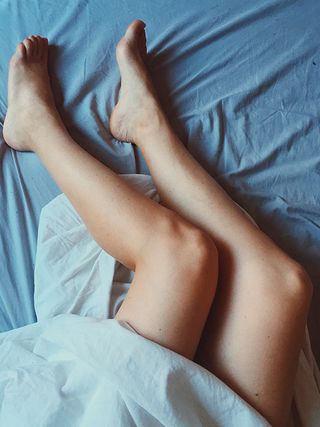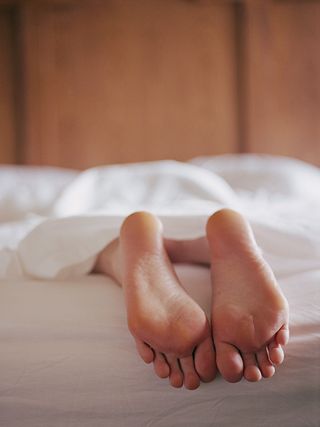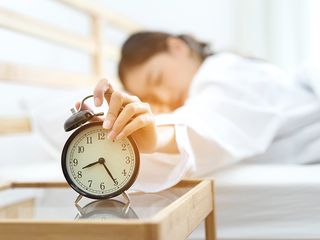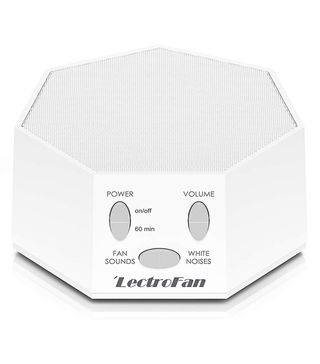This Is How a Sleep Doctor Treats Insomnia

It's pretty normal to experience a restless night of sleep at least once in your life. The scenario could look like this: You're lying in bed wide awake, continuously looking at the clock, thinking about how tired you're going to be the next day, and stressing about when you'll ever fall asleep. For some people, this might happen for one night only, but other people may experience chronic or long-term insomnia.
According to the U.S. Department of Health and Human Services' Office on Women's Health, insomnia is a sleep disorder that is defined as "an inability to go to sleep, waking up too early, or feeling unrested after sleep for at least three nights a week for at least three months."

Missing out on precious hours of sleep can really mess with your health and lifestyle. You could feel fatigued throughout the day, which can stop you from getting things done at work and in your personal life. When left untreated, it can also lead to or contribute to the development of other health problems, like depression, heart disease, and stroke.
"The definition of insomnia is difficulty initiating sleep, difficulty maintaining sleep, getting non-restorative sleep, and early morning awakenings with the caveat that you are getting adequate time to sleep," adds Rajkumar Dasgupta, MD, assistant professor of clinical medicine at USC's Keck School of Medicine and a spokesperson for the American Academy of Sleep Medicine. "And you have daytime problems—I can't mention that enough. Because, quite commonly, people always say, 'Hey, I'm getting six hours of sleep but I won three gold medals…' And I'm not worried about that person. What makes me motivated and aggressive about diagnosing and treating a nighttime issue is how you're functioning during the day."

So how do people take control of their sleep quality and say goodbye to insomnia? We asked Dasgupta about some of the treatments he recommends to his patients. Just remember that if you do have insomnia, or think you do, you should check with a healthcare professional first before you try any of the below. Sleep problems are very individualized, so what works for someone else might not work for you, and vice versa.
1. Identify the Type of Insomnia

Dasgupta says one way to categorize your insomnia is by figuring out if it's acute or chronic. "Acute insomnia usually occurs by having a life-changing event (a marriage, a divorce, a heart attack), and we could refer to that as adjustment insomnia," he explains. "And everyone has it. In theory, at least once the acute stress relieves your insomnia goes away. But there are some people where they are predisposed to insomnia, and once they get a trigger, it perpetuates. Based upon definitions, if you're having insomnia for greater than three months, multiple times a week, well, then we could call it chronic insomnia."
He also says that there's sleep-onset insomnia, which is difficulty falling sleep at the beginning of the night. And then there's sleep maintenance insomnia, which is the inability to stay asleep.
Knowing what type of insomnia you have will help your practitioner tailor a treatment plan for you.
2. Consider Other Contributing Factors

Dasgupta says many people assume that once you visit a sleep doctor, they're going to order a sleep study, but that's not the case for everyone. Your doctor will most likely want to learn more about your lifestyle and health history to understand why you are experiencing insomnia. "You don't need an in-lab or a home sleep study," he says. "The hardest part about diagnosing insomnia is that you've got to spend time with your patient. You've got to get a good sleep history and really figure out what medications are they on, what are other medical disorders do they have, and if there are other triggers. And is there a big psychiatric component?"
3. Try Cognitive Behavioral Therapy

Depending on the case, Dasgupta might try cognitive behavioral therapy. According to the Mayo Clinic, it's often the first step for treatment, and is "a structured program that helps you identify and replace thoughts and behaviors that cause or worsen sleep problems with habits that promote sound sleep." This might involve teaching the patient relaxation techniques and imagery, which can take some time and practice.
4. Take Medication

After finding that cognitive behavioral therapy isn't working for the patient, Dasgupta says he might consider prescribing medications. The type of medication will depend on what types of insomnia the patient has.
5. Try Stimulus Control

Dasgupta says stimulus control and sleep restriction (which we'll get to below) are two classic behavioral therapies he employs. "Stimulus control means the bed is only meant for one thing," he explains. "It is for sleeping, and it means that if you go to bed and you can't sleep within 15 to 20 minutes, you need to leave the bed, do things that are non-stimulating in a kind of a dim light, and then only go back to bed when you're ready to sleep. Easier said than done."
6. Try Sleep Restriction

Sleep restriction is what you might guess: a set bedtime and a set wake time. "This includes weekends, holidays, travel… those are strict foundations of what we do and those can work for people with acute insomnia and can work chronically," Dasgupta says.
7. Eat Healthy and Get Exercise

You want to make sure you're eating well and exercising regularly. The Mayo Clinic recommends avoiding large meals and beverages before bed and avoiding or limiting caffeine, alcohol, and nicotine, which can make it harder to sleep.
8. Meditate

Dasgupta says he personally thinks meditation is amazing and worth a try because there are very little downsides to it. Studies have shown that meditation can help with sleep, along with anxiety and stress.
9. Consider Other Wellness Methods

Testing out other wellness techniques that are low-risk can also help, too. "In some individuals, you've got to try to find out what their puzzle piece is," Dasgupta says. "So I never frown if someone says, 'I'm going to try blue light glasses,' or 'I'm going to use white noise for my insomnia,' or 'I'm buying a weighted blanket from my insomnia.' Of course, it's their decision to invest in these things, and a lot of times, it's hit and miss, you know?"
10. Keep a Sleep Diary

And if you're having trouble sleeping and are unsure if it's insomnia, you can always keep a sleep diary. "If you feel this is happening more than you think and you're trying to get to the root cause (could it be the diet, could it be the lack of exercise, could it be the fight I had with my significant other?), then do a diary," Dasgupta suggests.
Next: 9 Things to Buy for a Healthier Bedroom
Disclaimer
This article is provided for informational purposes only and is not intended to be used in the place of advice of your physician or other medical professionals. You should always consult with your doctor or healthcare provider first with any health-related questions.
Sarah is lifestyle writer and editor with over 10 years of experience covering health and wellness, interior design, food, beauty, and tech. Born and raised in Los Angeles, she attended New York University and lived in New York for 12 years before returning to L.A. in 2019. In addition to her work on THE/THIRTY and Who What Wear, she held editor roles at Apartment Therapy, Real Simple, House Beautiful, Elle Decor, and The Bump (sister site of The Knot). She has a passion for health and wellness, but she especially loves writing about mental health. Her self-care routine consists of five things: a good workout, “me” time on the regular, an intriguing book/podcast/playlist to unwind after a long day, naps, and decorating her home.

